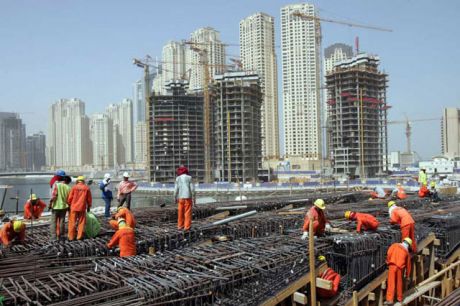"Over 200 million migrants contribute to the global workforce. Many struggle in low-paid and dangerous working conditions, are under-protected by home and host governments, and exploited by business."
On this International Migrants’ Day, painful reminders of the plight of millions of migrant workers are ever present.
Be it news of the appalling over-crowded and unsanitary conditions in migrant worker dormitories, young girls trafficked into the hospitality sector, domestic service or the sex industry, and the recent deadly blaze in a Bangladeshi garment factory which killed 112 workers, the exploitation of the migrant worker – who leaves his or her home to work in a distant place, within the country or beyond - is rife in countries around the world.
Over 200 million migrants contribute to the global workforce. Many struggle in low-paid and dangerous working conditions, are under-protected by home and host governments, and exploited by business.
These stark facts are all the more unacceptable when considered in the light of the enormous economic contribution of migrant workers, men and women, across many industry sectors and geographies. Without their labour, the global economy would cease to function in many ways. What practical steps are needed to ensure this vulnerable workforce receives greater protection and respect?
First, governments must be held accountable for their obligations to protect worker rights as spelled out in core International Labour Organization conventions. Second and equally important, the business community, regardless of sector or location, has its own responsibility to respect human rights as defined in the UN Guiding Principles on Business and Human Rights.
Companies face significant reputational risk if their due diligence regarding treatment of workers far down complex supply chains is inadequate. We know that ignorance is no excuse. Companies should know how migrant workers recruited in Bangladesh, India or Nepal are treated when they end up working in their suppliers’ factories in Jordan or Mauritius, or on construction sites of flash new hotels in Dubai or Malaysia, or, indeed, at home, in the booming towns like Gurgaon in India and export zones of Bangladesh.
The problem is not restricted to Asia – immigrant farm workers from Central America in the United States, women workers from the Mexican countryside in the country’s maquiladoras, and agricultural workers from North Africa in southern Europe and elsewhere too work in harsh conditions. If there is a risk of bonded labour in their suppliers’ or contractors’ operations, that risk travels up the supply chain to the very top.
It is encouraging to see that national legislation in some countries is finally moving in this direction. The United States is one hopeful example. In the state of California, legislation adopted in 2010 calling for greater transparency in supply chains requires companies whose business in California exceeds $100 million to post a disclosure concerning their efforts to combat trafficking in their own supply chains.
A related initiative has led to a recent US executive order strengthening protections against trafficking in US public procurement, focusing much needed greater attention on exploitation and abuse in company supply chains. In September this year, President Obama spoke of the urgency of combating modern-day slavery.
These and other initiatives by some governments are important developments. Yet as important as government-led efforts are in protecting migrant worker rights, business can’t and shouldn’t wait for governments to fix the problem. The company that does not undertake corporate human rights due diligence throughout supply chains risks being complicit in serious human rights abuses.
Do companies check to see whether contract workers are being charged intolerable levels of fees to secure a job overseas, or find themselves unable to escape from debt bondage, while working overseas or at home? Equally, due diligence means companies being aware of and taking steps to address risks such as passports of workers recruited abroad being withheld by their labour broker or employer, denying migrants lawful freedom of movement and means of identification.
Workers remain vulnerable whether they have travelled across political boundaries or within their own nations. Recent news of a new electronic text tracking system in Saudi Arabia to enable employers to keep tabs on migrant workers presents a serious infringement of the right to privacy. Similarly, media reports that locked exits in the Bangladesh factory where fire killed over 200 workers employed in factories servicing global markets constitutes a gross violation of fundamental labour rights.
As a contribution to ongoing efforts to protect migrant worker rights, the Institute for Human Rights and Business is today launching the Dhaka Principles for Migration with Dignity.
The Dhaka Principles, first discussed at a migration roundtable in Dhaka Bangladesh in July 2011, have developed over the past two years through a multi-stakeholder process involving companies, unions, governments and experts from around the world, to provide companies and other key actors with a set of overarching principles and practical guidance which applies from the point of recruitment of a migrant worker to the point of her safe return home.
On International Migrants Day 2012, the time has come for a global business commitment to protecting migrant worker rights around the world. That commitment should begin by putting the Dhaka Principles into practice. Doing so would constitute an important part of fulfiling the corporate responsibility to respect human rights. A powerful step in achieving a more just world for all is ensuring for all migrant workers the human dignity and decency of work that their contribution to the global economy merits, and which is their fundamental right.





























How should businesses respond to an age of conflict and uncertainty?
As 2024 began, European Commission President Ursula von der Leyen aptly summed up our deeply worrying collective moment. As she put it, speaking at the annual World Economic Forum in Switzerland, we are moving through “an era of conflict and...
26 March 2024 | Commentary
Commentary by Scott Jerbi, Senior Advisor, Policy & Outreach, IHRB